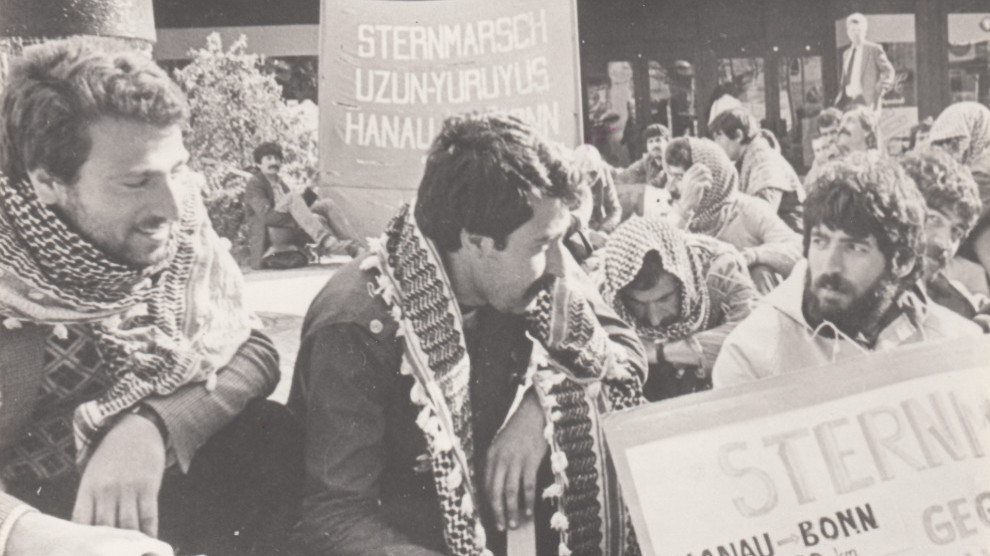"Bijî Serok Apo" - The story of a slogan
The slogan "Bijî Serok Apo" - "Long live Chairman Apo" can be heard at Newroz celebrations, demonstrations, guerrilla actions and funerals of the martyrs. What is the story behind this slogan?
The slogan "Bijî Serok Apo" - "Long live Chairman Apo" can be heard at Newroz celebrations, demonstrations, guerrilla actions and funerals of the martyrs. What is the story behind this slogan?

The slogan "Bijî Serok Apo" has a long history. It translates as "Long live Chairman Apo." "Apo" is not, as is often wrongly claimed, the Kurdish word for uncle, but refers to the short form of the name "Abdullah" for Abdullah Öcalan. But what is the background to this slogan, which is repeatedly criminalized, especially in Germany? The story goes back to 1984, when a handful of guerrilla fighters prepared for the first offensive in Eruh and Şemdinli. In this time before August 15th, the beginning of the armed struggle, more than 1000 people gathered in Europe to stand up for the Kurdish freedom fight with the first "Long March".
The first Long March
On April 24, 1984, the plan was presented to move in two trains from Hanover and Hanau to the then federal capital Bonn and to make the suffering and resistance of the Kurdish people known to the public. The train from Hanover was to run 418 kilometers, the train from Hanau 280 kilometers. Among the activists was Binevş Agal, who later became the symbol of the serhildan [uprisings] in Cizîra Botan (Cizre) in the early 1990s. The founder of the newspaper Özgür Politika, Enver Polat, and other people who were influential in the Kurdish freedom struggle also took part in the march. The then small PKK base wanted to remember, among others, the PKK leadership cadre Mehmet Karasungur and his comrade Ibrahim Bilgin, who had been murdered in a conspiracy in Southern Kurdistan. The demonstration trains arrived in Bonn on 10 May 1984. The following day, more than 500 people took part in a joint rally.
The next day, May 11, 1984, there was a solidarity concert for the activists who had been marching without interruption for 16 days in Cologne. The very popular Kurdish musicians Hozan Mizgin, Hozan Sefkan, Serdar and Hozan Zozan performed there. Kurdish cultural association HUNERKOM rented a hall in the University of Cologne for this purpose. The participants of the march sat in the first rows and the hall filled up quickly. An 1984 article in the magazine Serxwebûn describes the meeting as follows: "The people who participated in the celebration with the revolutionary songs of Mizgîn, Sefkan, Serdar, Zozan, Çiya and Koma Berxwedan and various folklore groups applauded the resistance and its leaders for minutes. The slogans 'Long live the PKK' [Bijî Partiya Karkarên Kurdistan] and 'Long live our chairman Öcalan' [Bijî Serokê me Apo] echoed through the hall. There was the hot atmosphere of starting a struggle and the people welcomed the dimension that our national freedom struggle has reached in the country and abroad.
This was the birth of the slogan "Bijî Serokê me Apo". It was intended to express the commitment to the freedom ideology of the PKK and its chairman. Some of the musicians who had performed there - Hozan Mizgîn, Hozan Sefkan and Hozan Çiya - fell as guerrilla fighters of Kurdistan in the following years. One of these artists was Seyidxan. He recounts how the slogan came about: "In a passionate moment, the members of HUNERKOM brought a picture of the chairman painted in oil paint to the stage. There were people at that time who had never seen his photo. The people cheered. One of the friends next to the stage shouted: 'Bijî Serokê me Apo'. The crowd picked up the slogan, stood up and chanted the slogan for minutes.
Mehmet Demir, who was responsible for the march from Hanover to Bonn, also says that he heard the slogan for the first time that night. He tells: "Until then a handful of PKK supporters chanted 'Bijî PKK'. They used the names from the prison resistance of Amed and shouted: 'Mazlum, Kemal, Hayri, forward with the people's war'. Then the slogan 'Bijî Serokê me Apo' appeared, which was shortened to 'Bijî Serok Apo'.
What did Öcalan say about the slogan?
Towards the end of the 1980s, the slogan spread throughout Europe, in all four parts of Kurdistan and in the metropolises of Turkey. With the rapid growth of PKK support, it was on everyone's lips. Then, in the 1990s, the popular uprisings, the serhildan, began in the cities. In March 1990 the people of Nusaybin, Cizîra Botan and Amed (Diyarbakır) revolted. Foreign journalists who were visiting Öcalan at the Mahsum Korkmaz Academy at the time asked the PKK leader what the slogan meant and how it came to be. Öcalan replied: "I don't know when it came up. There was a lack of leadership among the population. If you work according to the people's wishes, answer their needs, then something like “Serok Apo” comes out. When and by whom it was started, I do not know. But it is true that the Kurdish people do not accept leadership so easily. It is the people who are least willing to accept leadership. Because they have experienced much betrayal. Therefore, they have been observing and evaluating us for years. When the people saw that under our responsibility an unshakable, radical struggle against their enemy is being waged, not intimidated or defeated, millions have flooded into a bond with us.